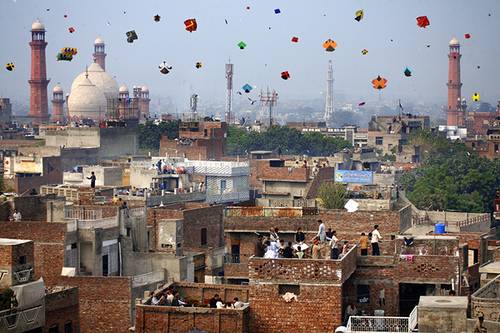One is peevish about many things, particularly in this column, but recently something just cut my heart to the quick. I received a random junk text—usually they are about computer software, golden mobile phone numbers or someone willing to buy my Hostess trolley off me.
This one was offering information about a grand Basant—in Sharjah. Let that sink in for a minute, two minutes if you are a Lahori. Basant in Sharjah. This is a slap on the face twice over. First, that there is a basant anywhere—if there is no basant in Lahore then nobody is allowed to have it either, because it is ours and belongs to us. The only other acceptable place is Indian Punjab, because of the Punjabi connection, but that is all. The second insult is that basant is being celebrated in Sharjah, in the UAE, also known as that Horrible Pit from Hell. No, no, a thousand times no. The monetization of basant is our prerogative! Turning a folksy celebration of spring, a Punjabi cultural rite of passage, into a ludicrous extravaganza of night basant and ladies wearing yellow and posing for photos pointing cheerily at the sky is our territory! Who gave Sharjah basant?
Sarcastic humour aside, I mourn basant every February. I come from a family of avid kite-flyers and I married one too, so the pinna is lodged deep in our hearts. Basant was better than anything else in the year, that one splendid day out on the many-storied roof of the ancestral building in Anarkali surrounded by family that had driven in from out of town and many friends who trekked the three flights of stairs to be with us. Certain cousins were the chosen pinna-holders, a task that required skill, speed and nerves of steel during a tense paicha. The rest of us would be peering at the skies, yelling competitive and annoying things to the rival neighbours and howling “bo kata!” as required. Someone on a neighbouring roof always had some kind of vuvuzela-esque horn to blare. It would be sunny, the breeze still had a wintry bite and fingers slashed by dorr were our badges of battle, proudly taped up. At the end of it all, tired and hoarse, we’d pack up and head to my dadi’s house, the grownups for tea and the children to scavenge drifting kites with the neighbourhood urchins. I don’t remember there ever being a fracas with the people on the surrounding rooftops, anyone getting hurt or ever feeling unsafe wandering Anarkali with a ragtag band of cousins. Dor would come floating down from the sky, someone would pull it down and snap it. Sometimes when you pulled, the dor would keep on coming, and it felt like the string was coming from another dimension.
Those were good days, when you could pull a thread and not have everything you knew and loved unravel around you. The tragedy of these past years has become an echo that haunts one, or should by now. Our beautiful, vibrant city is unraveling, and we continue to be helpless to stop it. It’s been years since we had basant, and most of our children don’t know the pleasure of rubbing a kite on your head to loosen up the spine, or how to thread dorr into a patang, or the difference between a patang and a guddi. The thrill of someone carefully holding a pile of colourful kites between flat palms, carrying them up to the roof. The rough balls of dorr, purple and brick-red and dark blue, and the scoffing dismissal one had for those newfangled charkhis with handles that made holding a pinna child’s play. The pull of dorr on your index finger as your kite finally caught the wind and came to life, soaring up into the sky, pulling the string through your hands with a joyfulness that traveled into your heart. The sight of Mall Road stretching down into the horizon, the light glinting on the leaves of the pipal trees. That is my Lahore. I don’t understand the people who have lived here their entire lives and can say with any conscience that the current destruction of the city is worth it. That this approach to modernisation is one that gels with the mood and face of the city, because anyone who has ever spent any time really interacting with the urban space of Lahore should know how she moves and breathes by now. Each city has a life of its own, and that life needs to be respected. Instead, everything we treasure is taken away from us. First it was basant, then it was our trees, now it’s our geography. Everything that gives us happiness is snatched away by people who would squeeze us dry of everything good and innocently joyful. It’s the same knee-jerk reaction to it all: don’t try and fix a problem, just get rid of it altogether. Dorr is injuring people, sometimes fatally? Don’t regulate the production of dorr, don’t create kite-flying zones to minimize the amount of dorr floating around the city. Just ban basant. In Urdu there is the saying ‘na rahega baans, na bajeygi baansuri’, which literally means if there isn’t a reed, there won’t be a flute. How ironic for us that the government has taken this to heart so literally that they are systematically taking the music out of our lives. Bo kata, Lahoriyon, how many lost paichas will we endure?






